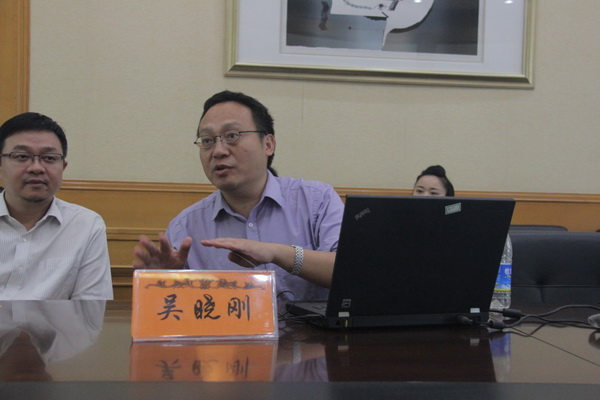On June 1, 2017, the 3rd Academic Salon for Ph.D. Students in Theoretical Economics in 2017 (the 31st in history) was held by the China Center for Special Economic Zone Research (CCSEZR), Shenzhen University (SZU) at SZU International Conference Hall A. The salon was graced by the presence of Prof. Wu Xiaogang, a professor of Social Science and founder-director of the Center for Applied Social and Economic Research (CASER) at Hong Kong University of Science and Technology (HKUST) and director of the journal Chinese Sociological Review (English SSCI journal). During the salon, he delivered an impressive speech titled “Building a Comprehensive Database for Social Science and Evidence-based Policy Research: Hong Kong, Shanghai and Shenzhen”. The salon was presided over by CCSEZR professor Mr. Zhong Ruoyu and gathered teachers from the CCSEZR and the College of Management and College of Phycology and Society of SZU and postdoctoral fellows and graduate students at the CCSEZR.
Prof. Wu Xiaogang’s speech is mainly divided into five parts, namely background information, Hong Kong Panel Study of Social Dynamics (HKPSSD), Shanghai Urban Neighborhood Survey (SUNS), research on Shenzhen’s urban development, and sum-up. When giving background introduction, he revealed that the Great Migration occurred in the US during 1910-1970 and the international migration boom emerged after 1970 have played an important role in the formation of the “Chicago School” and “Los Angeles School” of urban studies. With the rise of city/urban in China, urbanization will pick up speed in the next few decades in China, which presents not only graver challenges to social management and grassroots governance, but also opportunities for contemporary social scientific research. The past decade has seen Chinese universities, one after another, building their own professional survey and data centers and interdisciplinary data construction platforms, such as the China Family Panel Studies (CFPS) launched by Peking University and the Chinese General Social Survey (CGSS) created by the Renmin University of China. Nonetheless, most of these programs are nationwide and quite similar, which makes it difficult to conduct data analysis on a specific area.
Prof. Wu Xiaogang also pointed out that Hong Kong, as one of the models for urban studies in China, is struggling with rapid socio-economic transition, widening gap between the rich and poor and issues concerning people’s livelihood. To address all of these problems, the HKPSSD is established to probe into the impact of socio-economic changes on people’s livelihood by highly valuing space and census data and conducting follow-up surveys and home visit interviews. During the research process, a house-related subject was determined to evaluate the social effect of Hong Kong’s “Home Ownership Scheme”. The research indicates that “If they have a certain livelihood, they will have a settled heart”. Home ownership allows people to develop a middle-class mindset, which leads to improved life satisfaction and positive effects on the society.
Prof. Wu then moved on to the SUNS, which according to him, delivered real benefits as it facilitates think tank construction and provides reference service for the subject “Innovating Social Governance and Strengthening Grassroots Construction” of Shanghai Municipal Committee. The whole survey is designed into three levels, namely, surveys on communities (2014), households and family members. During household surveys, a layered multi-stage sampling method and questionnaires structurally similar to that of the HKPSSD were adopted. The research work of the SUNS mainly addresses the impact that life-space structure and community environment have on personal and family life. The research exposed residential segregation (internal heterogeneity) between the locals and migrants in Shanghai.
When introducing the research findings for Shenzhen’s urban development, Prof. Wu Xiaogang indicated that migrants make up 75.8% of Shenzhen’s population in 2010, up from the 0.48% in 1979, which makes Shenzhen a big migrant city. According to him, the spatial distribution patterns of Chaozhou natives and Hakka, Jiangxi natives and Hunan natives in Shenzhen suggest that migrants sharing the same origin or dialect are more likely to live in the same area and develop a strong group identity due to the China's broad geographic and cultural diversity, especially in an emerging migrant-dominated megacity like Shenzhen.
At the end of the speech, Prof. Wu Xiaogang stressed that we must get back to “people” when conducting urban research, suggesting that people is the enabler of economic growth and industrial transition, the foundation for social management and community governance, and the facilitator of better livelihood and living quality. We need to fully take into account the personal characteristics, social relations, and diverse demands of individuals in a specific space (e.g., block or community) of a city in order to distribute, manage, and standardize the service for public resources in a more targeted way.
During the discussion session, Prof. Wu Xiaogang and the teachers and students present at the salon explored such areas as the combined use of administrative data and survey data, a breakthrough in the theory and approach for urban research, and the use of survey and statistical software. The salon was concluded amid fervent discussions. (Correspondent: Zhang Chao)

Prof. Wu Xiaogang delivers an impressive speech

Prof. Zhong Ruoyu presides over the salon

The Q & A session of the salon

A group photo of the participants of the salon



